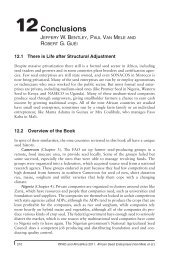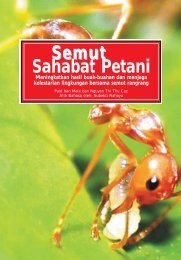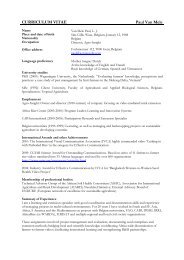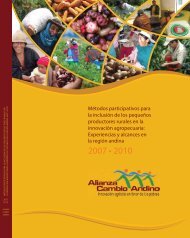Video-mediated farmer-to-farmer learning for sustainable agriculture
Video-mediated farmer-to-farmer learning for sustainable agriculture
Video-mediated farmer-to-farmer learning for sustainable agriculture
You also want an ePaper? Increase the reach of your titles
YUMPU automatically turns print PDFs into web optimized ePapers that Google loves.
To the question which websites people visited, sites of FAO, CTA and CGIAR Centres were the most<br />
commonly mentioned (albeit each by less than 5%). Many respondents had no clear target as <strong>to</strong><br />
where <strong>to</strong> look <strong>for</strong> videos and those who used Google or YouTube <strong>to</strong> guide their search mainly did so<br />
<strong>to</strong> get new ideas themselves rather than <strong>to</strong> download the videos <strong>to</strong> show <strong>to</strong> <strong>farmer</strong>s.<br />
The response from staff from national extension services <strong>to</strong> our on-line survey was relatively low,<br />
partly reflecting differences in infrastructure and equipment. Whereas staff at national research<br />
stations and universities often has access <strong>to</strong> a computer and the internet, this is not the case <strong>for</strong><br />
extension workers who often rely on public internet cafés. Contrary <strong>to</strong> researchers and academics,<br />
they pay <strong>for</strong> air time out of their own pocket.<br />
In nine states of the Niger Delta Region in Nigeria, 32% of the public and private extension workers<br />
(n=87) downloaded vital in<strong>for</strong>mation from the internet. Most respondents were between 40 and 45<br />
years old and had an MSc degree (Adesope et al., 2007).<br />
In five states in South-eastern Nigeria, about 81% of female researchers and 59% of female<br />
extensionists travelled on average 13 km <strong>to</strong> public cybercafés because their office computers are<br />
not connected <strong>to</strong> the Internet. Female extensionists spent an average of 4.4 hours on ICT weekly.<br />
About 70% of female extensionists and 44% of female researchers spent 5-8 hours on ICT weekly,<br />
<strong>for</strong> this (Adebayo & Adesope, 2007).<br />
Although India is one of the more advanced countries in ICT <strong>for</strong> development, the direc<strong>to</strong>r of Digital<br />
Green believes that a web-based plat<strong>for</strong>m <strong>for</strong> <strong>farmer</strong>-<strong>to</strong>-<strong>farmer</strong> video sharing should mainly target<br />
extension service providers, not <strong>farmer</strong>s directly.<br />
“There have been a few <strong>farmer</strong>s (mostly, progressive or urban) who have accessed our<br />
videos over the Internet and have anecdotally said that there has been value. Our work<br />
has largely been geared <strong>to</strong>ward supporting extension service providers… We still think<br />
that mediation and social organization are critical components in determining the<br />
effectiveness of the videos among farming communities.”<br />
Rikin Gandhi, Digital Green, India<br />
“This web-based plat<strong>for</strong>m <strong>for</strong> video will help the viewing centres at the rural level and<br />
also the radio will be able <strong>to</strong> make more impact on rural <strong>farmer</strong>s.”<br />
Adamu Musa Okonkwo, Gombe Media Corporation, Nigeria<br />
Many people indicated limited internet access and poor bandwidth as key constraints,<br />
with a few mentioning political restrictions on social media. For maximum impact both<br />
internet access and bandwidth are key issues that will need <strong>to</strong> be addressed through<br />
improved networking between organizations and physical sharing of video discs.<br />
“The main problem is that download speeds <strong>for</strong> us and many others in Tanzania are<br />
generally so slow that it is really difficult / impossible <strong>to</strong> download video from whatever<br />
source. I'm hoping this will change as the technology improves and gets cheaper (we pay<br />
per MB/GB) but currently our download speeds are of the order of 10kbps - 50kbps, or<br />
perhaps half an hour <strong>for</strong> a 5 min clip. Often it just times out and quits.”<br />
Michael Farrelly, Tanzania Organic Agriculture Movement<br />
<strong>Video</strong> <strong>for</strong> <strong>farmer</strong>s Agro-Insight, Oc<strong>to</strong>ber 2011 page 30







